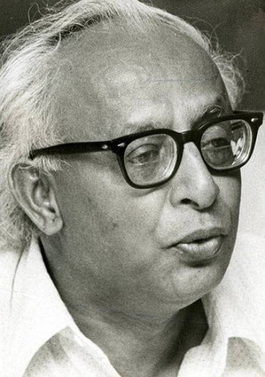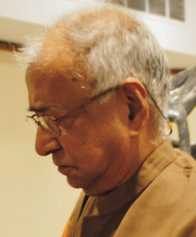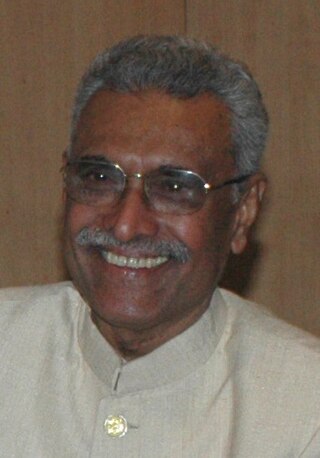Related Research Articles

Bhimrao Ramji Ambedkar was an Indian jurist, economist, social reformer and political leader who headed the committee drafting the Constitution of India from the Constituent Assembly debates, served as Law and Justice minister in the first cabinet of Jawaharlal Nehru, and inspired the Dalit Buddhist movement after renouncing Hinduism.

Ratan Parimoo is an Indian art historian from Kashmir, who has worked as an art educator, pedagogue, artist and former director of the Lalbhai Dalpatbhai Museum, Ahmedabad. Ratan Parimoo was one of the founder members of Baroda Group.

Mysore Narasimhachar Srinivas was an Indian sociologist and social anthropologist. He is mostly known for his work on caste and caste systems, social stratification, Sanskritisation and Westernisation in southern India and the concept of 'dominant caste'. He is considered to be one of the pioneering personalities in the field of sociology and social anthropology in India as his work in Rampura remains one of the early examples of ethnography in India. That was in contrast to most of his contemporaries of the Bombay School, who focused primarily on a historical methodology to conduct research, mainly in Indology. He also founded the Department of Sociology at the Delhi School of Economics, University of Delhi in 1959.

Ghulam Mohammed Sheikh is a painter, poet and art critic from Gujarat, India. He was awarded the Padma Shri in 1983 and Padmabhushan in 2014 for his contribution in field of art.

Kalpathi Ganpathi "K.G." Subramanyan was an Indian artist. He was awarded the Padma Vibhushan in 2012.
A. B. Shah (1920–1981) was the founder-president of the Indian Secular Society. The organization had its headquarters in Pune in Shah's lifetime but has now shifted to Mumbai. Until his death, A. B. Shah was the editor of The Secularist, a journal published by the Indian Secular Society (ISS). He also the edited the New Quest published by the Indian Association for Cultural Freedom. Shah took much interest in the problems of Indian Muslims. Shah's writings include What Ails our Muslims? and Religion and Society in India. Shah also edited Jayaprakash Narayan's Prison Diary, written by the prominent Indian leader in jail during the Emergency of 1975. Professor Shah was a mathematician and a scholar, who became interested in comparative religion and social reform, leading to founding Indian Secular Society.

Mysore Hiriyanna (1871–1950) was an eminent Indian philosopher, Sanskrit scholar and authority on Indian aesthetics. He was a Professor of Sanskrit at the University of Mysore and a contemporary of Sarvepalli Radhakrishnan. His classes on Indian Philosophy were comprehensive. His classroom dictations, published by Allen & Unwin in book form as "Outlines of Indian Philosophy" brought Hiriyanna international recognition. This was a seminal work on Indian Philosophy. His other prominent works include "Indian Conception of Values", "Essentials of Indian Philosophy", "The Quest after Perfection" and "Art Experience". He wrote extensively on the Vedic age, mainly on the Upanishads, followed by the evolution of Indian philosophical thought in the post-vedic era, deliberating mainly on Bhagavad Gita, the early years of Buddhism and Jainism. His work on aesthetics was authoritative and dealt mainly with Alamkaras, Aesthetics and Ethics, Method of Art, Indian Aesthetic Values and Art & Morality.

Arvind Krishna Mehrotra is an Indian poet, anthologist, literary critic and translator.

Sukhlal Sanghvi, also known as Pandit Sukhlalji, was a Jain scholar and philosopher. He belonged to the Sthanakvasi sect of Jainism. Pandit Sukhlal lost his eyesight at the age of sixteen on account of smallpox. However, he persisted and became profoundly versed in Jain logic and rose to become a professor at Banaras Hindu University. Paul Dundas calls him one of the most incisive modern interpreters of Jain philosophy. Dundas notes that Sanghavi represents what now seems to be a virtually lost scholarly and intellectual world. He was a mentor for famous Jain scholar Padmanabh Jaini. During his lifetime he won such awards as the Sahitya Akademi Award and won recognition from the Government of India by getting Padma Bhushan award. Sukhlalji was also known as Pragnachaksu because he was so vastly learned despite being visually disabled.
Shiv Visvanathan is an Indian academic best known for his contributions to developing the field of science and technology studies (STS), and for the concept of cognitive justice, a term he coined. He is currently Professor at O P Jindal Global University, Sonepat. He was Professor, Dhirubhai Ambani Institute of Information and Communication Technology (DA-IICT), Gandhinagar, India and has held the position of Senior fellow Center for the Study of Developing Societies (CSDS) in Delhi He has also taught at the Delhi School of Economics. He has held visiting professorships at Smith College, Stanford, Goldsmiths, Arizona State University and Maastricht University, Harvard University & Oxford University. He is author of Organizing for Science, A Carnival for Science and has co-edited Foulplay: Chronicles of Corruption. He has been consultant to the National Council of Churches and Business India.

The Rathva or Rathwa is a Subcaste of the Koli caste found in the Indian state of Gujarat. Rathava Kolis were agriculturist by profession and turbulent by habits but now lives like Adivasis such as Bhil because of their neighborhood
Krishna Kumar is an Indian intellectual and academician, noted for his writings on the sociology and history of education. His academic oeuvre has drawn on multiple sources, including the school curriculum as a means of social inquiry. His work is also notable for its critical engagement with modernity in a colonized society. His writings explore the patterns of conflict and interaction between forces of the vernacular and the state. As a teacher and bilingual writer, he has developed an aesthetic of pedagogy and knowledge that aspires to mitigate aggression and violence. In addition to his academic work, he writes essays and short stories in Hindi, and has also written for children. He has taught at the Central Institute of Education, University of Delhi, from 1981 to 2016. He was also the Dean and Head of the institution. From 2004 to 2010, he was Director of the National Council of Educational Research and Training (NCERT), an apex organization for curricular reforms in India. He was awarded the Padma Shri by the President of India in 2011.

The Koli is an Indian caste found in Rajasthan, Himachal Pradesh, Gujarat, Maharashtra, Uttar Pradesh, Haryana, Karnataka, Odisha and Jammu and Kashmir states in India. Koli is an agriculturist caste of Gujarat but in coastal areas they also work as fishermen along with agriculture. In the beginning of 20th century, the Koli caste was recognised as a denotified tribe under Criminal Tribes Act by the Indian Government because of their anti-social activities during World War I.
Susan Visvanathan is an Indian sociologist, social anthropologist and a fiction writer. She is well known for her writings on religious dialogue and sociology of religion. Her first book Christians of Kerala: History, Belief and Ritual among the Yakoba is a pathbreaking work in the field of sociology of religion.
Indian Sociological Society (ISS) is a professional body of sociologists in India. It publishes academic research journals, the Sociological Bulletin in English and the Bhartiya Samajshastra Sameeksha in Hindi language.
Rajni Kothari was an Indian political scientist, political theorist, academic and writer. He was the founder of Centre for the Study of Developing Societies (CSDS) in 1963, a social sciences and humanities research institute, based in Delhi and Lokayan, started in 1980 as a forum for interaction between activists and intellectuals. He was also associated with Indian Council of Social Science Research, International Foundation for Development Alternatives, and People's Union for Civil Liberties.
Prof. Aninhalli R. Vasavi, also known as, A.R.Vasavi, is a Social Anthropologist and an Independent Researcher-based out of Bengaluru, with interests in agrarian studies, sociology of India and educational studies. She did her M.A. and M.Phil. in Sociology from the University of Delhi, and her PhD in Social Anthropology from Michigan State University in 1993. with a thesis "The harbingers of rain : culture and drought in Bijapur, India." She has worked at the Indian Institute of Management ̶ Ahmedabad, and for 14 years at National Institute of Advanced Studies (NIAS), Bengaluru, including a year as Dean of Social Sciences.

Tharailath Koshy Oommen is an Indian sociologist, author, teacher, and Professor Emeritus at the Centre for the Study of Social Systems, Jawaharlal Nehru University. He was awarded Padma Bhushan, the third highest Indian civilian award in 2008 for his services to the fields of education and literature by the President of India.
Akshay Ramanlal Desai was an Indian sociologist, Marxist and a social activist. He was Professor and Head of the Department of Sociology in University of Bombay in 1967. He is particularly known for his work Social Background of Indian Nationalism in which he offered a Marxist analysis of the genesis of Indian nationalism making use of history, which set a path to build socialism in India.
References
- ↑ Patel, Tulsi (January 2021). "Professor Arvind Manilal Shah: Researcher, Teacher and Institution Builder". Sociological Bulletin. 70 (1): 111–124. eISSN 2457-0257. ISSN 0038-0229.
- ↑ Shah, Arvind M. (2014). "Foreword". The Writings of A. M. Shah The Household and Family in India. Orient Longman. ISBN 978-8-12505-340-8.
- ↑ "A look at India with a sociological approach". The Telegraph. 12 December 2015. Archived from the original on 17 January 2016. Retrieved 25 April 2017.
- ↑ "About Indian Sociological Society". Indian Sociological Society. Retrieved 24 April 2017.
- ↑ "Office Bearers Over The Years" (PDF). Indian Sociological Society. Retrieved 24 April 2017.[ permanent dead link ]
- ↑ The Writings of A.M. Shah: The Household and Family in India, Center for Advanced Study in the Behavioral Sciences at Stanford University
- ↑ Swaminathan, Padmini (June 2011). "Book Review". Journal of Social and Economic Development. 13 (2).